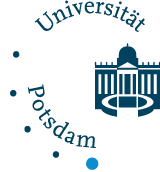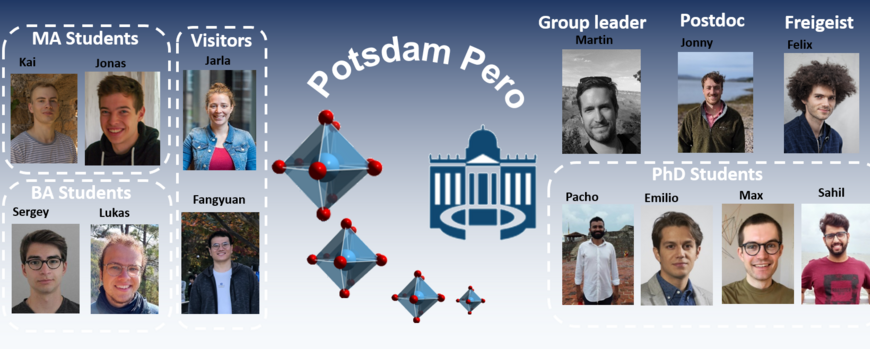PotsdamPero Group Members
Jonathan Warby (Postdoc)
email: warby@uni-potsdam.de
I am originally from the UK and I am a postdoc in the group working on perovskite silicon tandems. I completed my Bachelor and Masters degrees at Durham University in Chemistry. My masters thesis was on the synthesis of luminescent pH probes for cell imaging. I conducted my PhD investigating stability of perovskite LEDs at the University of Oxford under the supervision of Prof. Henry Snaith. Outside of work I enjoy baking bread, brewing beer and playing basketball.
Felix Lang (ROSI's Group leader )
email: felix.lang.1@uni-potsdam.de
Felix is a Feodor Lynen Research Fellow from the Alexander von Humboldt Foundation, focusing on the investigation and understanding of radiation-induced defects in halide perovskites. He received his Ph.D. in physics from the Technical University Berlin, studying the stability and degradation of perovskite solar cells, which he conducted at the Helmholtz-Zentrum Berlin. He followed up as a postdoctoral researcher within the group of Prof. Sam Stranks at the Cavendish Laboratory of the University of Cambridge, where he tested and developed next-generation perovskite tandem photovoltaics for space photovoltaics.
Sahil Shah (PhD Student)
email: sahil.shah@uni-potsdam.de
Despite the exceptional progress of perovskite solar cells, the mechanism governing interfacial recombination is still in debate. A better and more fundamental approach is required to understand the states and pathways the recombination proceeds. To do that I am employed in the SURPRISE project which is about Understanding and suppressing Interfacial charge recombination for high-performance Perovskite Solar cells. My research aims to understand the role of interfacial energy alignment between the perovskite and transport layers and the physical nature of C60-induced interfacial traps. For this, I will use a range of complementary measurement techniques for example transient and steady-state photoluminescence as well as electro-optical transient measurement.
Emilio Gutierrez-Partida (PhD Student)
email: gutierrezpartida@uni-potsdam.de
I am interested in the various recombination processes in the perovskite solar cells and I try to understand the main performance limitations in these devices. Attacking these problems from a material science point of view is my main focus. I am looking forward for a company to take perovskite solar cells to an industry level therefore, I am also interested in studying degradation mechanism, tandems and upscaling.
Francisco Peña-Camargo (PhD Student)
email: penacamargo@uni-potsdam.de
Both the deployment and scale-up of perovskite solar cells imply a thorough understanding of the fundamental physical phenomena underlying light absorption, charge separation, carrier transport and energy generation of photovoltaic devices at a laboratory-scale. To achieve this goal, my research focuses on the development and characterization of thin-film partial stacks and working devices by means of several techniques, namely, electroluminescence and photoluminescence spectroscopy, transient photovoltage and photocurrent measurements. These allow me to assess their loss mechanisms and recombination channels, and thereby finding the path to the optimization towards the thermodynamic limits. Of my particular interest are the wide-bandgap single-junction perovskite solar cells with organic transport layers intended for tandem applications.
Max Grischek (PhD student)
email: max.grischek@helmholtz-berlin.de
My research is focused on all-inorganic perovskites for highly efficient tandem solar cells. To this end, I make use of photoluminescence measurement techniques to determine the efficiency potential of perovskite films and to conduct detailed loss analysis in comparison to organic-inorganic perovskites. My main affiliation is with the Young Investigator Group Perovskite Tandem Solar Cells at Helmholtz-Zentrum Berlin.
Jarla Thiesbrummel (PhD student visitor from Oxford)
email: thiesbrummel@uni-potsdam.de
My research focusses on trying to get a better physical understanding of different perovskite systems. Currently, I am mainly looking into the effect of mobile ions and doping on device performance. In order to do this, I use a combination of experimental work and simulations.
My main affiliation is with the group of Prof. Snaith at the Oxford University, but I am currently visiting the PotsdamPero group.
Fangyuan Ye (PhD student visitor from ECUST)
email: y20180135@mail.ecust.edu.cn
My research is focused on the development of novel charge transport materials as well as interfacial materials. I am interested in studying the relationship between material properties and their effect on device performance, then summarizing the law for selection of suitable materials and further material optimization. Recently I am aiming to minimize the non-radiative recombination loss between perovskite layer and the adjacent layer by introducing new self-assembled monolayer or passivation layer.
I am a Phd candidate from East China University of Science and Technology (ECUST), and now I am a visitor in the PotsdamPero group.
Kai Oehring (Master’s student)
email: k.oehring@campus.tu-berlin.de
The aim of my master’s thesis research project is the successful realization of novel organic-perovskite tandem cells, as well as a thorough characterization of said cells using various methods. Those include electrical measurements, photoluminescence measurements, opto-electronic measurements, device simulations etc.
Jonas Diekmann (Master's Student)
email: jonas.diekmann@uni-potsdam.de
Sergey Babeyko (Bachelor student)
email: sergey.babeyko@uni-potsdam.de
I am working on bachelor thesis with a focus on reducing open-circuit voltage losses in low-bandgap perovskite systems by changing the perovskite stoichiometry.
Lucas Holte (Bachelor student)
email: holte@uni-potsdam.de
I joined the perovskite group this year to work on my bachelor thesis. The focus of this work will be on understanding recombination and ionic losses in all-perovskite tandem cells.
Former Members:
Pietro Caprioglio (PhD Student / Postdoc)
My research aims in the realization of monolithic perovskite / silicon tandem solar cells on textured wafer surfaces that are utilized for optimum light management. To pursue my goal I will develop new strategies to process inorganic-organic perovskite films on textured silicon surfaces. Additionally, my research focuses on the fundamental physical understanding of the film formation and of the transport and recombination of charges in this type of tandem structure.
Christian M. Wolff (PhD Student / Postdoc)
My interest lies in the fundamental understanding of working principles and loss mechanisms in perovskite solar cells. I try to understand the interplay between the perovskite absorber material and the adjacent organic transport layers, on time scales ranging from ps to steady-state conditions. In particular I use (transient) optical / electronical measurement techniques to assess the dynamics of charge carriers in films, single crystals and working solar cell, and to use this knowledge to optimize the multilayer architecture.
Vincent M. Le Corre (Postdoc)
email: lecorre@uni-potsdam.de
My research interest is mainly focused on understanding the device physics of organic and perovskite solar cells. To do so I use simulation tools, mainly drift-diffusion modeling, to understand the limitation of state-of-the-art devices. By reproducing the experimental results with the simulations we can bring a clearer picture of what happens within the device and target the main limitations for future optimization. I also use the simulation to refine our analysis of classical measurements when applied to perovskites as their ability to transport both electronic and ionic charges usually strongly influences those measurements.
Karol Peters (Bachelor Student)
email: karpeters@uni-potsdam.de
My focus lies on developing an automated setup for transient and JV measurements. Therefore, I am working on a software for communication with measuring instruments to acquire data and perform various calculations to compute characteristics of perovskite solar cells. I started with coding my software for fast hysteresis measurements (JV characterisation at different scan speeds) but I am expanding the software by other transient measurements such as CELIV and BACE. Another aspect of my work is to build the needed setup with the most cost effective equipment possible to make my work avaiable to other labs specified on solar cells.

